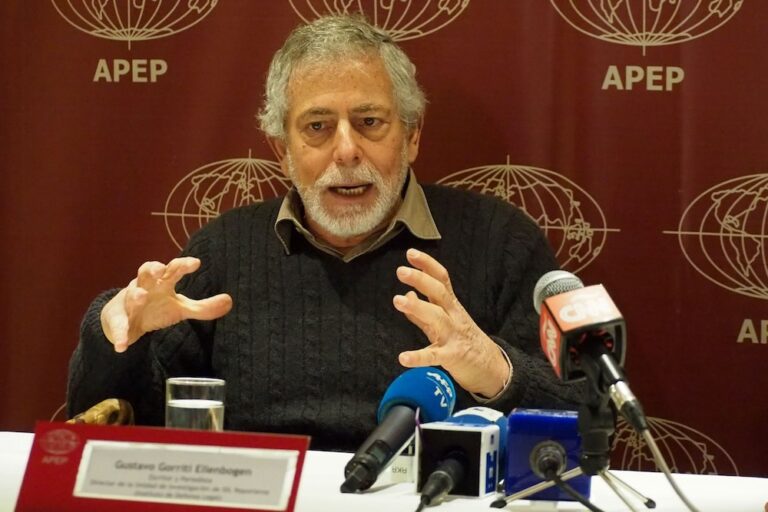(IPYS/IFEX) – On 2 July 2000, the director of “El Comercio” daily, Alejandro Miro Quesada Cisneros, stated that journalists from the newspaper and Canal N were threatened once again for having investigated and disseminated information about the falsification of signatures of supporters of the Peru Independence Front 2000 (Frente Independiente Perú 2000), the political party […]
(IPYS/IFEX) – On 2 July 2000, the director of “El Comercio” daily, Alejandro Miro Quesada
Cisneros, stated that journalists from the newspaper and Canal N were threatened once again for having investigated and disseminated information about the falsification of signatures of supporters of the Peru Independence Front 2000 (Frente Independiente Perú 2000), the political party headed by the current president, Alberto Fujimori.
The threat stems from statements made by a member of congress for the governing party, Edith Mellado, who spoke in an intimidating fashion, according to Miro Quesada. Mellado indicated that Canal N’s recording of a telephone conversation between a reporter and a supervisor of the electoral enumerators “is telephone tapping, and therefore the television channel and ‘El Comercio’ employees can be seen as having committed a crime.” Miro Quesada pointed out that the refusal to accept the tape recording as evidence was used to justify the exoneration of another member of congress for the governing party, Oscar Medelius – one of the main protagonists in the falsification of signatures, according to the results of an investigation reported on Canal N.
Miro Quesada stated that this warning is a concrete example of how, in Peru, those who publish reports that are critical of the government are constantly subject to threats, and added that the government is accustomed to using this strategy to undermine the press.
In addition, the director of “El Comercio”, addressing the high level mission of the Organization of American States (OAS), denounced the continued legal harassment of the daily. In particular, he noted that he had received a resolution from Attorney General Julia Eguía Dávalos, ordering that the investigations into the alleged illegal use of the MUC (Mercado Único de Cambio) exchange rate dollars be reopened. The office of the public prosecutor had previously declared that there was insufficient binding evidence in the case and that the penal action was barred by a limitation period, since the events had transpired more than ten years ago.
He questioned the fact that an event of this nature took place precisely as the government is announcing a process of democratisation in the country, and as the democratic sectors are demanding authentic signs of the political will to eliminate any type of manipulation of the country’s institutions by the government. “Just as true signs of Peru’s democratisation are being solicited, and as a high level mission of the OAS is visiting Peru, a door through which they attempt to control the press by holding Damocles’ sword above ‘El Comercio’ has been reopened,” stated Miro Quesada.
Recommended Action
Send appeals to authorities:
– demanding a stop to the harassment and intimidation on the part of the government against “El Comercio”
Appeals To
APPEALS TO:
Alberto Fujimori Fujimori
President of the Repulic
Fax: +51 1 427 6722 / 426 6535
Martha Hildebrandt Pérez
President of the Congress of the Republic
Fax: +51 1 426 8290
Edgardo Mosqueira Medina
Minister of the Presidency
Fax: +51 222 3678
Alberto Bustamante Belaunde
President of the Council of Ministers
Fax: +51 1 447 1628 / 475 0689
Blanca Nélida Colán
Attorney General
Fax: +51 1 426 2474
Jorge Santistevan de Noriega
Ombudsman
Fax: +51 1 426 6657
Lloyd Axworthy
Minister for External Affairs for Canada
Fax:+613 944 4000
César Gaviria
Secretary General of the OEA
Fax:+202 458 3624
Jorge Fascetto
President of the Inter American Press Association
Fax: +305 635 2272
Please copy appeals to the source if possible.


